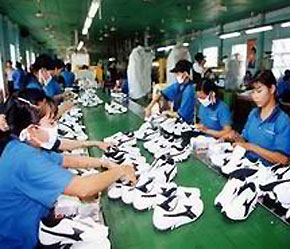Foreign firms reject tax-evasion charges
 |
| Workers make footwear for export at Pou Yuen Vietnam Company, 100 per cent capital owned by Taiwan, in Ho Chi Minh City’s Binh Tan District |
It has become very common among foreign firms in Vietnam to report losses.
For instance, QMI Industrial Vietnam Company has reported a loss of up to VND3.4 billion ($170,000) every year since 2004.
They added up to VND8.4 billion ($420,000) by 2009, accounting for 52.7 of its legal capital.
Explaining the company’s losses, deputy general director Yin-Cheng Chuang said it was due to interest on loans.
With its capital eroding, to avoid bankruptcy, the firms plans to hike its legal capital to $1 million.
This may sound like a reasonable explanation but some of the others do not sound so credible.
Sunglory Company, which manufactures clothes for export at a plant in Ho Chi Minh City’s Binh Tan District, incurred accumulated losses of VND6.5 billion ($325,000) by 2009 though its capital is only VND1.7 billion ($85,000).
Asked why the company has not filed for bankruptcy and has indeed continued to expand despite the huge losses, deputy general director Hsiu-Ying Liao said: “Sunglory has run its business with money customers advanced, of about VND4.4 billion ($220,000).”
But the explanation does not wash since even that money has been used up.
Clover Vietnam Co has suffered accumulated losses of VND18.6 billion ($930,000) in the nearly two years since its establishment while its registered capital is only VND23 billion ($1.15 milion). It is not clear where it has been getting its operating capital from.
The company has not filed for bankruptcy because its parent company has reportedly pledged an infusion of funds and rescheduling of its debts by a year.
Orange Fashion Company has a chartered capital of VND30 billion ($1.5 million), but in five years if operation it has run up total losses of VND53 billion.
Seog Deog Lee, a company spokesperson, said in its first two years (2005 and 2006), the company had revenues of nearly VND150 billion ($7.5 million) but had to spend much on renting facilities and nearly VND12 billion ($600,000) on administrative costs.
As result, it suffered a loss of VND3.5 billion ($175,000), he said.
Though in 2007 the turnover soared to VND284 billion ($14.2 million), it still made a loss of VND7.1 billion ($355,000) because the company had to move and had to spend on new assets, he said.
He said turnover kept rising in 2008 and 2009 too, but so did management costs, leading to more losses.
Though clearly most firms’ explanations lack credibility, tax agencies do not have enough staff or the capability to call their bluff.
Since their financial statements are attested by auditors and are ostensibly above board, tax officials cannot find evidence against them.
Moreover, because the market is governed by the law of supply and demand and firms are free to negotiate selling and buying prices, tax employees do not have the right to question such numbers.
A taxation official said one firm bought used machinery made in China but its books indicated a purchase price equal to that of brand new machinery made in Japan.
Tax authorities could not take any action because the firm had the purchase papers in order, he said.
What the stars mean:
★ Poor ★ ★ Promising ★★★ Good ★★★★ Very good ★★★★★ Exceptional
Related Contents
Latest News
More News
- Hermes joins Long Thanh cargo terminal development (February 04, 2026 | 15:59)
- SCG enhances production and distribution in Vietnam (February 04, 2026 | 08:00)
- UNIVACCO strengthens Asia expansion with Vietnam facility (February 03, 2026 | 08:00)
- Cai Mep Ha Port project wins approval with $1.95bn investment (February 02, 2026 | 16:17)
- Repositioning Vietnam in Asia’s manufacturing race (February 02, 2026 | 16:00)
- Manufacturing growth remains solid in early 2026 (February 02, 2026 | 15:28)
- Navigating venture capital trends across the continent (February 02, 2026 | 14:00)
- Motivations to achieve high growth (February 02, 2026 | 11:00)
- Capacity and regulations among British areas of expertise in IFCs (February 02, 2026 | 09:09)
- Transition underway in German investment across Vietnam (February 02, 2026 | 08:00)

 Tag:
Tag:




















 Mobile Version
Mobile Version